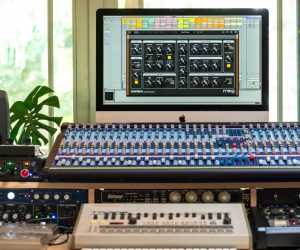
Moog Unleashes Muse: The Future of Analogue Synthesis
Muse merges classic Moog analogue circuits with advanced digital controls.
Moog Music has announced the release of Muse, an eight-voice analogue bi-timbral polyphonic synthesizer designed to inspire and elevate musical creativity. Muse is now available globally, merging classic Moog analogue circuits with advanced digital controls to create an instrument that gazes boldly into the future while honoring Moog’s storied past.
Muse represents the culmination of over five years of dreams, design, and passion from Moog’s engineering and product team. This studio or performance centerpiece is driven by eight analogue voices, each with two voltage-controlled oscillators (VCOs), a modulation VCO, dual voltage-controlled filters (VCFs), and a stereo voltage-controlled amplifier (VCA), all with that recognizable kinetic analogue quality.
From Historical Inspiration to Modern Innovation
Muse combines discrete oscillators derived from the Minimoog Voyager, a saturating mixer, dual transistor ladder filters, and stereo discrete VCAs inspired by Moog Modular circuits. This powerful analogue foundation is paired with forward-thinking digital controls, including a 64-step sequencer with sequence chaining, parameter recording, and probabilistic editing, as well as a powerful arpeggiator and chord memory, providing deep editing capabilities and generative behaviors that fuel musical expeditions.
Steve Dunnington, Moog engineering veteran of 30 years, expresses the inspiration for this next-generation synth. “With Muse, we’ve created a Moog polysynth that combines the warmth and sonic power of vintage Moog analogue technology and the flexibility of digital control to create a deep and expressive instrument for the modern musician to explore and create with. It’s been a labor of love for everyone involved over the last several years involving many people who worked hard to bring it to life. We are excited and grateful to share the results our team worked hard to achieve — from our in-house product development and design team to the artists we collaborated with to test the instrument’s firmware, develop user presets, and create videos that show Muse’s full functionality.”
Key Features of Muse:
- Analogue Powerhouse: Eight analog voices, each with two VCOs, a modulation VCO, dual VCFs, and a stereo VCA.
- Performance-Oriented Controls: Intuitive knob-per-function layout with “More” menus for each module.
- Advanced Modulation and Sequencing: Two LFOs, a dedicated Pitch LFO, assignable envelopes, and a 16-slot modulation matrix per-timbre per-patch.
- Diffusion Delay: A stereo processor inspired by vintage digital rack delays, adding depth and dimension to any sound.
- Bi-Timbrality and Voice Control: Two independent timbres per patch, which can be stacked or split across the keyboard.
Specifications:
- Keybed: 61 full-size semi-weighted keys with velocity and channel aftertouch
- Controllers: Pitch Wheel, Modulation Wheel, Macro Knob, Keyboard Octave switch, Hold switch, Sustain Pedal input, Expression Pedal input – all pedal functions are assignable
- Panel Controls: 44 knobs, 16 sliders, 129 buttons – OLED screen
- Analogue Voltage-Controlled Oscillators: (x2) Selectable Triangle/Sawtooth mix, variable width Pulse wave, Octave (16’, 8’, 4’, 2’), Frequency (+/- 7 Semitones), Wave Mix (blends Triangle/Sawtooth with variable Pulse wave), FM routing and amount, Hard sync
- Analogue Voltage-Controlled Modulation Oscillator: Selectable waveform (Sine, Sawtooth, Reverse Sawtooth, Square, Noise), Audio range toggle switch, Keyboard tracking, Keyboard reset, Unipolar switch, Pitch Modulation routing and amount, Filter Modulation routing and amount, Pulse Width Modulation routing and amount, VCA Modulation amount, Panning switch
- Analogue Voltage-Controlled Filters: (x2) Moog transistor ladder filters (1 with highpass/lowpass modes), Cutoff Frequency, Resonance, KB Tracking Amount, Envelope Amount, Linked Operation, Routing (Series, Parallel, Stereo)
- Analogue Voltage-Controlled Amplifier: Volume per Timbre, Pan position per Timbre, Pan Spread per timbre
- Arpeggiator: Per-timbre with Clock Division, Octave range, Pattern, Direction, Gate time, Rhythmic programming
- Sequencer: 64 step sequencer with Clock Division, Transport controls, Sequence chaining, Step editing, Modulation capabilities, and memory capacity of 16 banks of 16 sequences
- Outputs: Main Left/Right, Headphones, CV In/Out, Clock In/Out, MIDI In/Out/Thru, USB
- Dimensions and Weight: 99 x 42 x 11 cm, 14.55 kg
Muse: Now Available for Order Worldwide
Muse is now shipping to authorized dealers globally. Find a local Moog dealer to experience Muse first-hand and explore the vast sonic landscapes it offers.

















RESPONSES